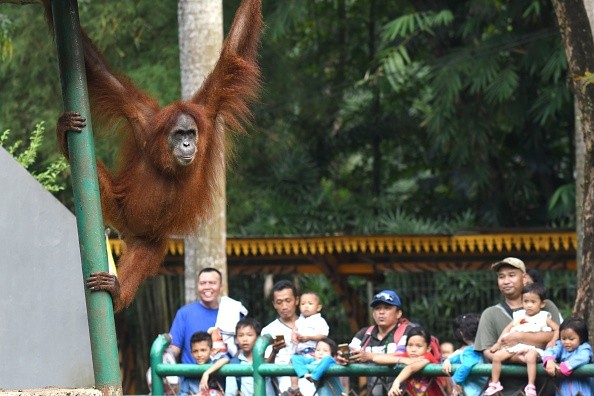COVID-19 affects not just humans, but also our closest relatives - the great apes. According to a group of specialists, including Oxford Brookes University academics, jungle hikers may be putting the lives of Critically Endangered orangutans at risk by spreading human viruses such as COVID-19.

How Tourists Expose Orangutans to Human Viruses
The researchers looked at Instagram photos of visitors in Indonesia and discovered that they were disobeying the rule of keeping a 10 meter distance by taking photographs, touching, hugging, or feeding orangutans in the wild.
This practice exposes orangutans to human viruses, which may lead to infections that are could cause death, according to Phys.org.
Andrea Molyneaux, the study paper's lead author and a dedicated champion for safe jungle trekking practice in North Sumatra, stated, that danger of zoonotic disease transmission between people and orangutans is quite worrying.
There are rules in national parks that warn visitors about the consequences, but findings suggest that tourists may be unaware of them. The conservation community as a whole seems to be uninterested in raising awareness of these regulations.
There is an urgent need to raise awareness of these guidelines so that visitors understand they must not approach or feed orangutans.
Possible Disease Transmission
Only two islands in the world are home to orangutans: Sumatra and Borneo, and the International Union for Conservation of Nature and Natural Resources has classified all three species as "Critically Endangered" on the Red List of Threatened Species.
The staff at Gunung Leuser National Park in Indonesia's North Sumatra noted a lack of attention to rules when people visited the orangutans there.
In the images reviewed, researchers noticed people stroking, petting, snuggling, feeding, and going extremely near to orangutans for selfies, said Emma Hankinson, an ecologist and Ph.D. student at Oxford Brookes University.
Emma also said she spent a lot of time in Sumatra and has seen such things firsthand. Between humans and the orangutans they visit, there is a significant risk of disease transmission.
She claimed that COVID-19 pandemic has raised public awareness of disease risk, and researchers hope that this will have a beneficial influence on visitors to Gunung Leuser National Park and other great ape tourist locations, encouraging them to follow the guidelines.

Animals Affected by the Pandemic
Three captive western lowland gorillas at the San Diego Zoo tested positive for SARS-CoV-2 in January 2021, prompting the zoo to vaccinate four orangutans and five bonobos with the Zoetis COVID-19 vaccine.
Nine captive western gorillas at the Atlanta Zoo tested positive in September 2021. The virus that causes COVID-19 is SARS-CoV-2, indicating that the present pandemic may potentially infect great apes.
This essential and relevant article highlights a lack of respect for orangutans, by people demanding near closeness for a selfie, who appear ignorant that this conduct might put orangutans at danger of illness, stated Ashley Leiman OBE, Director/Trustee of Orangutan Foundation UK.
Visitors should remain 10 meters away from Critically Endangered orangutans if they want to observe them now that the world is beginning to open up.
Related Article : Malaysia's Critically Endangered Orangutans Tested for Coronavirus
For more news, updates about orangutans and similar topics don't forget to follow Nature World News!
© 2025 NatureWorldNews.com All rights reserved. Do not reproduce without permission.





